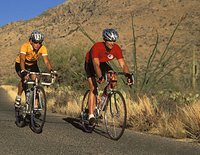 The internet is a scary place to research your medical information. Anybody and his brother can make a very credible looking website to provide medical "information" and unfortunately much of the time, that information is woefully inaccurate. At times it may even be dangerous.
The internet is a scary place to research your medical information. Anybody and his brother can make a very credible looking website to provide medical "information" and unfortunately much of the time, that information is woefully inaccurate. At times it may even be dangerous.
Thankfully, the folks who brought us Quackwatch have put together their own peer-reviewed medical search engine - The Internet Health Pilot. It searches only through evidence-based medical information and therefore provides only safe, reliable and informative results.
Monday, May 29, 2006
A Healthy Search Engine
Tuesday, May 23, 2006
Don't Sit Too Close to the Candy Bowl!
 As anyone who's ever tried to lose weight before knows, proximity matters. Some foods simply can't be allowed into the house.
As anyone who's ever tried to lose weight before knows, proximity matters. Some foods simply can't be allowed into the house.
Now, thanks to Dr. Brian Wansink, we have proof that sitting too close to the candy bowl is probably a bad idea.
Dr. Wansink is the John S. Dyson Professor of Marketing at Cornell University and is the director of Cornell's Food and Brand Lab whose mandate it is to study "Why, What, When, and How Much We Eat".
In this months issue of the International Journal of Obesity Dr. Wansink details a study involving Hershey's Kisses.
The study was conducted over "Secretaries Week" where 40 secretatries from six different departments at the University of Illinois were given bowls of Hershey's Kisses. Each day each bowl was filled with 30 kisses. There were 20 clear bowls and 20 opaque bowls and there were four different study designs: Clear bowl right in front of you, opaque bowl right in front of you, clear bowl 6 feet away, opaque bowl 6 feet away. Every day researchers would swing by and count how many kisses were left in the bowl.
The results revealed that when the kisses were 6 feet away in an opaque bowl the average number of candies consumed per day was 3.1. 6 feet away in a clear bowl, 5.6, opaque bowl right in front of them, 4.6 and when in a clear bowl right in front of them, 7.7.
So not surprisingly, both visibility and proximity increase consumption. What was interesting was that proximity had a somewhat unexpected finding. When the food was more accessible people underestimated how many kisses they had vs. overestimating when further away.
A few bottom line messages. First, leave foods you want to eat more of in more visible and accessible locations. Don't banish your fresh fruits and vegetables to opaque crispers, leave them right out in the open on your fridge shelves and your countertops. Secondly, the bad stuff, don't necessarily throw it out but hide it behind other foods and banish it to the furthest reaches of your cupboard spaces. Lastly, if you ever get the chance to see Brian Wansinck give a lecture, jump at it - he's one of the best speakers I've had the pleasure of seeing.
Thursday, May 18, 2006
Self-hate Weight
 In this week's edition of the journal Obesity, there's a very sad article that quantifies just how pervasive the anti-fat bias in America really is.
In this week's edition of the journal Obesity, there's a very sad article that quantifies just how pervasive the anti-fat bias in America really is.
It has long been established that obese people are stigmatized in education, employment and heath care. As well, it seems that the negative attitudes and stereotypes associated with obesity are acceptable in society given that we still regularly see them as the butt of jokes on television and in Hollywood.
It may surprise some readers here to learn that even obese people discriminate against the obese. In this study 37% of obese respondents reported that they preferred thin people, 27% of obese respondents said that thin people were more motivated and 27% of obese respondents said fat people were lazier.
This study also looked at "Personal trade-off items", meaning what would you be willing to give up or do in order to not be obese.
Of healthy weight individuals, 18% would rather give up 10 years of their lives than be obese, 36% would rather be divorced than be obese, 27% would rather be infertile than be obese, 21% would rather be severely depressed than be obese, 20% would rather be an alcoholic than be obese, 7% would rather lose a limb than be obese and 5% would rather be blind than be obese.
Now while those numbers are in and of themselves shocking, they become more shocking when you consider how the authors got their data. This study was funding and publicized by the Rudd Institute, an organization whose mission it is to address stigmatization and discrimination of obese individuals. The over 4000 respondents likely heard of the study either from the Rudd Institute's website, attending a presentation on weight sitigma given by one of the authors, or reading a news article on stigma that made reference to the website where the study's data were collected. Therefore the people who responded with such negative attitudes and stereotypes towards obesity were actually the people in society who might be expected to have the least amount of anti-fat bias.
Like the Rudd Institute says, "See the person, not the pounds". Clearly as a society, we still have a long way to go.
Tuesday, May 09, 2006
Track Calories with your Keychain!
 I always recommend tracking calories to patients trying to lose weight. The simplest analogy is money, and the currency of weight in our bodies is calories. Before you buy anything, you need to know how much it costs.
I always recommend tracking calories to patients trying to lose weight. The simplest analogy is money, and the currency of weight in our bodies is calories. Before you buy anything, you need to know how much it costs.
Calorie counting can be difficult and while there are many free online services that can help track calories (www.sparkpeople.com, www.fitday.com) they still require hunting for calories.
No more. Enter Training Peak's Calorie Scanner which conveniently fits on your keychain and then scans the barcodes of the foods that you're eating. Couple that with Training Peak's online/desktop calorie software and all of a sudden those barcodes translate into calories and nutritional information.
Only problem I can see is that my from scratch spaghetti sauce doesn't come with a barcode.
Cost is a bit steep as well - $216.30 for a scanner with a one year subscription.
Monday, May 08, 2006
It's Depressing to Stop Exercising
 This month the journal Psychosomatic Medicine published a very interesting paper on the effects of stopping exercise on mood.
This month the journal Psychosomatic Medicine published a very interesting paper on the effects of stopping exercise on mood.
Their study involved taking 40 regular exercisers (>30mins per time, >3times/week) who were not taking or receiving any psychological or psychiatric treatment, and simply asking 20 of them to stop exercising for two weeks. They then compared symptoms and mood between those who continued exercising versus those who stopped.
Within one week of stopping exercise, compared with folks still exercising the study subjects reported more fatigue and depressive symptoms which then worsened in week number two.
While we probably didn't need a study to prove this (anyone who exercises regularly and has to stop knows this to be true already), here is now proof of yet another reason not to stop exercising!
Friday, May 05, 2006
The HP Photosmart R927 Super Incredible Diet Plan
 Perhaps in response to our growing waistlines HP has come up with a Super-Incredible-Diet-Plan - don't lose weight and use their cameras with their "slimming" feature and presto-chango you've lost weight.
Perhaps in response to our growing waistlines HP has come up with a Super-Incredible-Diet-Plan - don't lose weight and use their cameras with their "slimming" feature and presto-chango you've lost weight.
The picture here shows the subtle changes the camera produces using Hurley from Lost fame.
If this isn't a sad statement about where we've come as a society, I don't know what is.
Thursday, May 04, 2006
Today is Project ACES Day - Another misguided effort in the war on obesity.

I can't tell you how frustrated I get when events such as Project ACES are touted as soldiers in the fight against obesity.
Started by Len Saunders, a New Jersey schoolteacher in 1989 Project ACES (All Children Exercise Simultaneously) involves trying to get children across the world exercising for 15 minutes simultaneously.
Going to the Project ACES website it promotes itself as making, "fitness fun for kids", "promoting health and nutrition", "promoting sport and exercise", and "supporting physical education", and there is no doubt in my mind that all of those are worthy, wonderful and achievable goals for the Project.
You know what's not an achievable goal? Having 15 minutes of exercise a day put a dent in childhood obesity rates. Yet the AP describes Project ACES this way, "Students in all 50 states and at least 50 other countries were urged to exercise en masse for 15 minutes Wednesday, all to curb alarming rates of childhood obesity."
So why is it not reasonable to report Project ACES as an obesity intervention? Quite simply, exercise does not burn that many calories.
In fact I would argue that were the Canadian and American governments successful at getting every last citizen to exercise 30 minutes a day it would actually lead to North Americans growing even larger because then everyone would feel justified in rewarding their exercise with food. They would feel justified because our governments and countless allied health organizations constantly present the misguided notion that exercise alone is enough to lead to weight loss or prevent weight gain.
Fact is 30 minutes per day of exercise probably burns no more than 250 calories. Reward exercise with food 3 times a week and kiss 30 minutes of even daily exercise goodbye. It takes well over an hour of vigourous exercise to work off one Big Mac or a bag of potato chips.
If we are to succeed in preventing the rise of obesity in our countries, the focus has to be on food and more specifically on calories.
I can't tell you how many patients I've seen who've said to me, "I shouldn't be this weight because I exercise a lot", or, "It doesn't make sense because I only eat healthy food."
Obesity prevention, fitness and healthy eating are all extremely important determinants of health. To lump them all together as one effort takes away from the importance of each in our health and discourages those who "eat healthy" and "exercise" but don't lose weight, from ever trying.

